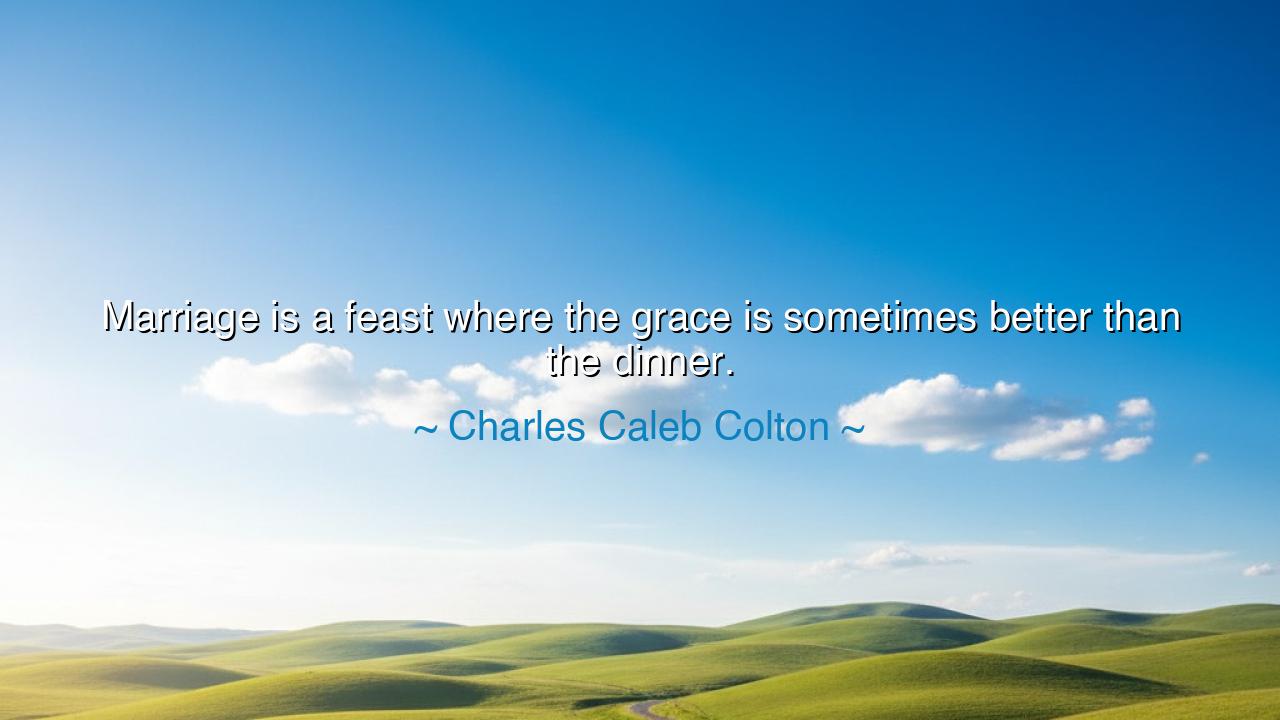
Marriage is a feast where the grace is sometimes better than the






“Marriage is a feast where the grace is sometimes better than the dinner.” These words of Charles Caleb Colton, the English cleric and essayist, speak with the wit of a philosopher and the understanding of a man who knew both the joys and the disappointments of life. On the surface, his saying glitters with humor, but beneath its gentle irony lies deep wisdom about love, expectation, and endurance. Colton reminds us that marriage, like a great banquet, is often more glorious in ceremony than in substance — that what begins in splendor may not always be sustained in satisfaction. Yet within this jest lies no bitterness, only truth spoken with the calm acceptance of experience.
When Colton calls marriage a feast, he evokes the image of celebration — a gathering of souls, families, and promises. The wedding day shines with abundance: vows are spoken, hearts are full, music fills the air. It is the grace before the meal — the prayer of gratitude, the blessing of hope — that often feels divine. But when the feasting begins, when the years unfold and reality sets in, one may find that the grace — the intention, the spirit, the ideal — was more perfect than the daily fare that follows. For life after vows is not a poem of endless delight, but a prose of shared labor, misunderstanding, forgiveness, and quiet perseverance.
Colton’s humor conceals a moral truth: that in marriage, beauty often lies not in what is served, but in the blessing that begins it. The grace — the love, faith, and goodwill that unite two souls — is pure, unspoiled, radiant with promise. The dinner, however, is the living of that promise — sometimes nourishing, sometimes bitter, often humble. When he says the grace is better than the dinner, he does not condemn marriage; he simply reveals that human expectation often outshines reality, and that true contentment lies not in feasts without flaw, but in hearts that remain grateful despite imperfection.
The ancients spoke often of this truth. The philosopher Epictetus taught that happiness depends not on events, but on our perception of them. So too in marriage: the wise do not expect every day to be sweet, but find sweetness even in the days that are hard. Consider the marriage of John and Abigail Adams, who spent long years apart while John helped forge the new American republic. Their letters reveal both longing and struggle. Yet even when separated by an ocean, they began each correspondence with tenderness and faith — the “grace” that sustained the meal of their shared life. The food of companionship was not always plentiful, but the blessing that began it never ceased.
Colton himself, a man of the clergy and letters, lived in an age when marriage was often treated as both a social contract and a spiritual duty. His remark may have been spoken in jest to amuse the drawing rooms of London, but its meaning endures across centuries: that the spirit of gratitude and humility is what gives life meaning, even when reality falls short of our dreams. Every feast, no matter how splendid, will end; but those who savor the grace — who find joy in the act of giving thanks — remain nourished long after the table is cleared.
And so it is in love. There will be seasons when the table of marriage is rich with joy, and seasons when it feels empty and cold. But if one remembers the grace — the first spark of affection, the reason two souls joined their destinies — then even the simplest bread will taste sweet. For gratitude transforms what is ordinary into something sacred, and memory of love renews what time has wearied.
Let this be the lesson, then, drawn from Charles Caleb Colton’s words: do not measure marriage by its feast, but by its faith. Let not disappointment extinguish the gratitude that once gave birth to joy. Attend to your partner not as one who expects to be fed, but as one who offers to serve. Speak the grace every day — in kindness, in patience, in remembrance of love’s beginning. For in this way, even when the dinner grows plain, the spirit of grace will sustain both hearts, and the feast of life, though imperfect, will never truly end.






AAdministratorAdministrator
Welcome, honored guests. Please leave a comment, we will respond soon